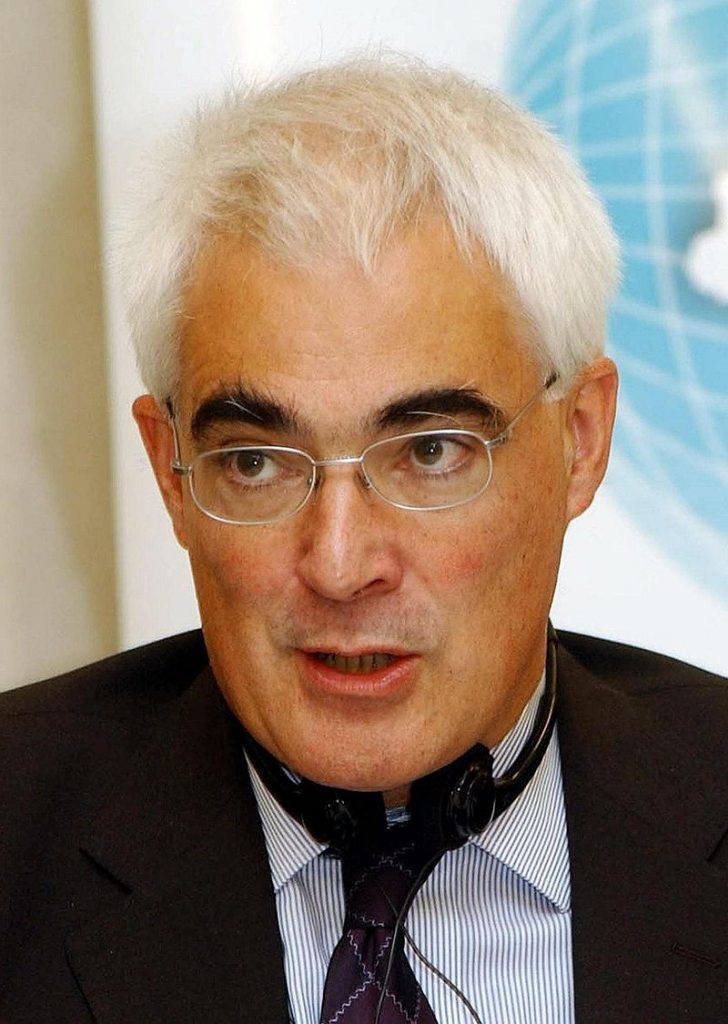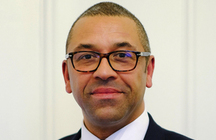Alistair Darling – 1997 Speech to the Proshare Annual Awards Dinner
The speech made by Alistair Darling, the then Chief Secretary to the Treasury, on 3 December 1997.
Introduction
1. This is the fourth Proshare award ceremony that I have attended.
2. I am under no illusions about my fate. The day that I entered the Treasury my attention was drawn to the rogues gallery – the portraits of my predecessors dating back to the early 1960s, when the ancient office of Chief Secretary was established.
3. An examination of the photographs revealed that my five immediate predecessors had all lost their seats at the election two days earlier.
4. In its short five years existence, Proshare has been enormously successful. I have always thought that the 1980s rhetoric of the “shareholding democracy” was misplaced. It was a political slogan. It wasn’t real. Indeed it was counter productive rhetoric.
5. The fact is that more and more people do shares directly or indirectly. That’s all to the good. People should know the relationship between the Stock Market and their shares. And individual shareholding has worked for many but it isn’t for everyone. Lets be realistic about it.
6. But the more people understand share holding the better. We want to encourage people to save and to invest. And Proshare has played a vital part in promoting that wider understanding.
7. And of course, the best and most successful businesses are those where everyone in the enterprise from boardroom to the shop floor is fully engaged in its success. Everyone should have a stake in the enterprise in which they are engaged. It brings out the best in people.
8. And encouraging employee share ownership is a important part of that – nearly 2 million employees now belong to one of the approved schemes. We want to see employee share ownership expand. Shareholding should encourage participation and responsibility.
9. And Proshare has been active promoting wider understanding of share holding and financial services generally. This award ceremony helps that process.
10. Indeed Proshare is something of a pioneer in promoting the use of plain English – helping demistify the world of finance.
Share holding and saving
11. We want to encourage saving which is why yesterday we launched the new Individual Savings Account.
12. We believe that everyone should have the opportunity to provide for themselves – whether they are saving for their future, for their retirement or simply for a rainy day.
13. ISAs are aimed at encouraging everyone to save. They will be simple, flexible and accessible – something everyone wants and will get.
14. Our objective is to develop a tax system for savings which benefits the many and not just the few. Half the population don’t save. So everyone should have the opportunity to save in a tax-favoured environment, however small the amounts they are able to put aside.
15. As we promised in our manifesto, the ISA builds on the experience of PEPs and TESSAs. That is why investments in ISAs will be tax-free – up to 50,000 – and 100,000 Pounds for couples.
16. We spend 1.3 billion Pounds on tax relief under the present system – rising to 1.7 billion Pounds in 2001-02. Much of this goes to those who can already afford to save significant amounts and to tie their savings up for long periods of time. That isn’t an efficient use of public money. Our objective is to bring in new savers.
17. Far better and fairer to use the existing provision to bring the benefits of ISAs to a much wider population of savers – possibly encouraging 6 million new savers. That is right in principle and it is fair.
18. Two weeks ago we published our consultation paper on stakeholder pensions. The consultation document we published yesterday on ISAs builds upon this. More and more people want to make provision for themselves and we want to encourage them
to do that.
Supervision and regulation
19. And if we are to encourage saving we need a regulatory environment that commands the support and respect of the industry and public alike.
20. We promised reform at the election. Four days after the election we gave operational independence to the Bank of England. And three weeks later we set out how we would deliver the radical overhaul to the regulatory system we promised.
21. And, just over a month ago the new Financial Services Authority was launched. It will take over the work of nine existing regulators.
22. In the global economy where markets are changing every day, where innovation and diversity are an essential part, the need for a new regulator that has power and flexibility is essential.
23. For the first time the regulator will have statutory objectives clearly set out. And the authority will to promote a greater understanding of the benefits and risks associated with financial products. The draft financial services Bill, updating and replacing the various pieces of legislation covering financial services, will be published next year for
consultation.
24. If we want to encourage people to save and invest we have to make sure they have the information they need.To have confidence in the regulatory system. That’s good for them and its good for business. Good regulation should be complimentary to the business process.
The savings culture
25. We want to build the savings culture. That is good for individuals. It is good for businesses and is therefore good for the country as a whole.
26. But of course the Government has also to foster the right economic climate to enable businesses and individuals to plan for the long term.
The Government’s economic approach
27. The world has been transformed over the last few years. We live in a global economy. Industries typically span geographical and political boundaries. No country can go it alone. Our objective is to ensure Britain is equipped to rise to the challenge of the world’s new and fast changing economies.
28. We are determined that this country, the first industrial nation, should be ready and equipped to seize the opportunities and a new global economy where its skills creativity and adaptability will mark us out. And there is a new confidence in Britain today.
29. It’s not the job of the Government to pick winners or to second guess management.
30. But Government must address the fundamental weaknesses that have held us back for too long. Economic instability. Boom and bust. Underinvestment. Productivity up to 20% below that of our competitors. Unemployment and the waste of talent of too many people.
The Government’s economic objectives
31. In the six months since we took office, we have begun to put in place the building blocks we need. To raise the rate of sustainable growth to increase the prosperity of the country, so that everyone can share in higher living standards and greater job opportunities.
32. First, monetary stability and low inflation – the essential precondition for growth. Good for business, for savers, for those on fixed incomes.
33. We have given operational independence to the Bank of England to set interest rates to achieve the Government’s target for inflation. We have put in place the most open and accountable set of procedures in the world. And already long term interest rates have fallen.
34. Second, fiscal stability. The Chancellor in his Budget in July put in place a deficit reduction plan, cutting the huge burden of debt left by the last Government. We spend 25 billion Pounds a year servicing public debt. More than we spend on schools. And at this stage in the cycle we should not be adding to the country’s debt.
35. Thirdly, the Comprehensive Spending Review which I announced earlier this year will conduct a root and branch examination of the 320 billion Pounds the Government spends: 5000 Pounds for every man, woman and child. It will ensure affordable and sustainable public finances and which will set the spending priorities of this Government, for the rest of this Parliament and beyond.
36. And fourthly, removing barriers to growth. We must expand our economic capacity and create the right climate for high levels of investment. That is why we have reformed the corporation tax system, removing the distortions that hinder long term, high quality investment.
37. In the last Budget we cut corporation tax to the lowest level ever. And we intend to cut the main rate again when ACT is abolished in 1999. This further enhances our position as the country with the lowest rate of corporation tax of any major industrialised country and one of the lowest tax burdens on business.
38. And modernising the welfare state, getting more people back into work. Investing in skills and training. Removing the inflationary pressures that have undermined growth in the past. We have taken the tough decisions. Putting the funding of higher education on a sustainable footing for example. All for the long term good of the country.
39. So the building blocks are there. Stability, sound public finances, removing barriers to growth and a commitment to open markets.
40. This Government is outward looking. We have to be and that has driven our policy in Europe as elsewhere.
41. We are determined to open markets and engage constructively in Europe. Both the Chancellor and the Prime Minister have made it clear that we are determined to put in place the necessary preparations which will allow Britain to decide to join EMU if economic conditions justify it.
42. We’re one of the most open economies in the world – trading 25 per cent of our GDP compared with America’s 10 per cent. And nearly 60 per cent of our exports are to mainland Europe and an astonishingly high level of international investment into Europe – 30 per cent of it – comes to the UK.
43. In less than 14 months from now the German business selling products to France and the Netherlands will be able to do so without exchange rate risk, with lower transaction costs and with more transparent prices, something that in itself will be a big challenge to a British competitor hoping to supply the same order.
44. So EMU will lead to fiercer competition for trade and for future investment across Europe. And the time to prepare is now long overdue.
45. We are working with business to prepare for the introduction of the Euro in 1999. The Euro will affect each and every one of us.
Preparing for the future
46. In Europe and at home are objectives to obtain long-term stability. Stability in policy making. Stability in the economy.
47. Our pre-Budget report last week marks another innovation. It sets out the major economic issues facing the UK in the run-up to the Budget in the Spring and beyond.
48. In the modern economy, demand for more openness and transparency than in the past. Openness builds confidence in the Government’s ability and determination to maintain economic stability.
49. And we set out clear choices for the country. There is the opportunity now for sustainable growth. Growth that will create job opportunities and generate the wealth this country needs.
Conclusion
50. Tonight sees awards for individuals and business on whose success we all depend. Government’s job is to compliment business effort. To prepare the country for the future. To maintain economic stability. To ensure a skilled and adaptable workforce.To open markets in Europe and elsewhere.
51. But no Government can ever take the place of individual flair. It is that innovation and enterprise that we celebrate tonight.


